 Future Unicorns
Future Unicorns
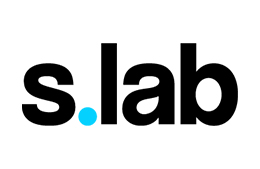
S.lab Asia is a South Korean fixed-temperature chain logistics provider. The company specializes in containers that maintain stable inside temperatures for fresh food, pharmaceuticals, and medical devices. In fact, the startup is famous for having transported 63.5% of the country's COVID-19 vaccines.
- Story
- Data
S.lab Asia vows to tackle trifecta of challenges in cold chain logistics
The use of Greenie Medie can slash cost, maintain stable temps and be more eco-friendly, the company says
During last year’s COVID-19 pandemic, one startup stood out in South Korea’s logistics sector.
S.lab Asia developed a temperature-controlled box called Greenie Medi, which was responsible for 63.5% of the country’s vaccine transportation.
The vaccines developed by Pfizer Inc., which need to maintain an inside temperature of minus 70 Celsius (-94 F), were wholly transported inside Greenie Medi boxes.
S.lab Asia was – and still is – the only company in South Korea that can meet Pfizer’s specific logistics requirements.
But the Greenie line of products was not initially made for transporting vaccines.
S.lab Asia is a cold-chain packaging company that specializes in containers that maintain stable inside temperatures for fresh food, pharmaceuticals, and medical devices.
The startup claims it poured 45,000 hours into research and development to become the industry’s top player in Asia.
The COVID-19 pandemic, despite its dampening effect on the global market, gave the budding startup an opportunity to showcase its abilities.
Sophia Lee founded S.lab in 2014, choosing S as the first letter of her own name and also to connote a “super” lab.
“The transport of COVID-19 vaccine is only part of S.lab Asia’s story,” Lee said. “We plan to grow as a leader in the Cold Chain as a Service (CCaaS) sector by providing not just packaging but an unprecedented platform.”
Contents
-
[Problem to solve] Plastic replacement
Lee began her entrepreneurial journey after leaving a trading corporation.
Lee focused on exporting South Korean ingredients for skincare and cosmetics products to Southeast Asia.
She realized there was a demand for ultra-low temperature-c controlled logistics in Southeast Asia and decided in 2016 to take on that demand.
Lee considered it a niche market, which Korea’s bigger and better-known logistics companies did not serve.
Naturally, the company started handling more than just the raw materials for skin care and cosmetics and moved on to other areas such as food that needed to stay refrigerated or frozen while en route.
In the early stage of her business, demand for Korean food and beauty products was skyrocketing thanks to the rising popularity of South Korean pop culture.
Even though business was good, Lee was uncomfortable with the massive amount of styrofoam boxes that her business generated.
“Because of the particular nature of styrofoam, recycling them is quite challenging,” the founder said, adding that it takes about 500 years for styrofoam to fully disintegrate.
The now 37-year-old said she felt her business was contributing to global warming as burying 1kg of styrofoam emits about 3kg of carbon dioxide.
In addition to the waste, containers made out of styrofoam do not maintain a consistent inside temperature. That weighed on Lee’s conscience, knowing that she was delivering food that went through multiple rounds of freezing and thawing.
In 2019, Lee decided to develop new packaging for cold-chain logistics to replace styrofoam.
The process began with setting up a research and development (R&D) center in Seongnam City, Gyeonggi Province, and hiring a large number of researchers.
This changed the company’s human resources makeup from nearly all of the staff being in sales to researchers taking up about a quarter of the entire workforce. There are currently some 30 researchers in the company.
The R&D team focused its efforts on making semi-permanent packaging that would replace disposable containers made of styrofoam.
The company hired materials specialists and product designers.
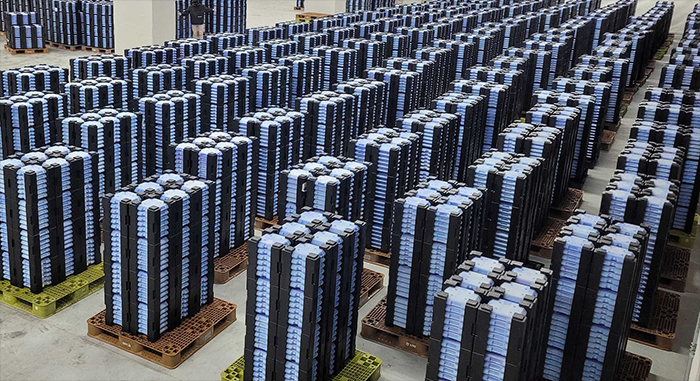
Phase Change Materials (PCM) developed by S.lab Asia
S.lab Asia had a two-prong approach to develop Phase Change Materials (PCM) to maintain a consistent temperature within the containers, and Vacuum Insulation Panels (VIPs) to block outside heat from entering the containers.
“One of the tasks was to figure out the containers’ pricing and weight, as well as the procurement time,” Lee said, adding that having a solid product doesn’t mean anything without marketability.
Thanks to these efforts, in 2020 S.lab Asia launched an eco-friendly container able to maintain a low temperature inside the box for up to 24 hours without power.
Prior to the Greenie Box launch, the company conducted a Point-of-Care test to deliver clams caught on Ganghwa Island to Singapore. From the South Korean island to Singapore, the temperature rose by just 2.6 degrees Celsius, still cool enough for the live clams to survive the international journey. -
[Value Proposition 1] Making cold-chain logistics more approachable
There were three main problems with packaging fresh food prior to Greenie Box.
The first issue was the high cost.
Apart from conglomerates that can afford to fill a large container with the same products, most small to mid-sized companies did not have the budget to ship fresh food across long distances.
These companies would ship products with a long shelf life for long-distance shipping and lose out on delivering fresh food to distant markets.
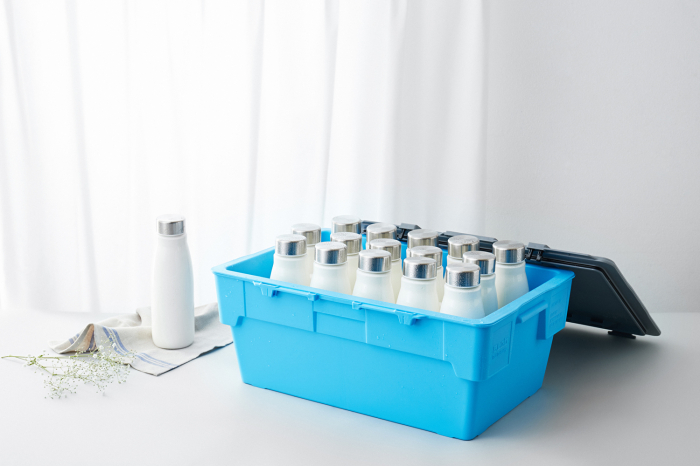
Greenie MEDI boxes can be used for foodstuffs, pharmaceuticals, and medical devices
Greenie Box solved this issue.
The separate compartments in the larger box can each be adjusted to different temperatures so a diverse range of products can be placed in separate boxes and shipped at the same time. In other words, the function that allows for customized inside temperatures offers the flexibility of shipping different products in one cargo container.
This paved the way for smaller-scale farming co-ops to send their products to big cities or even abroad for a relatively low cost.
Lee said: “Previously, we had to use two refrigerator trucks to transport two types of products that require different temperature controls. Utilizing Greenie Box, one refrigerator truck could transport two different items, meaning at least a 50% reduction in logistics cost.”
While a Greenie Box is more expensive than a styrofoam box, Lee explained her products can be used multiple times over the span of at least three years. According to the company’s calculations, Greenie Box users save some 5-10% in packaging costs.
The reduction in costs is even more noticeable when compared to the air transport option. Using a Greenie Box to ship by boat is at least 80% more affordable than renting a special container for air transportation.
The second issue was that styrofoam cannot seal against the outside temperature, which results in some of the products going bad and later getting discarded.
This was a double whammy as the customers had to wait longer for replacements and incurred higher costs for producers.
S.lab says Greenie Box decreases such food waste by 15-20%.
The third issue was that using styrofoam was not environmentally friendly. According to Statista, the world produces about 10.29 million tons of styrofoam and of that number, 3.08 million tons end up in landfills.
The production and the burying of styrofoam emit about 26.75 million tons of carbon dioxide.
S.labs Asia estimates a single Greenie Box can replace some 168 styrofoam boxes in a year.
Lotte Fresh & Deli, one of the largest food distributors in South Korea, is also a client of S.lab Asia. Last year, it announced the decision to use only Greenie Boxes for its transport of seafood.
The Lotte Group affiliate explained, “The switch will reduce our styrofoam consumption by 22 tons a year.”
S.lab estimates that some 800,000 styrofoam boxes are in demand for transporting seafood in South Korea.
Going forward, the company plans to expand its foothold into other sectors to replace styrofoam boxes used for livestock and dairy products. -
[Value Proposition 2] Systemizing medical transport
The company’s Greenie Box innovation isn’t just an alternative for styrofoam in food transport.
Lee has found a new opportunity in which a Greenie Box can be used, more than just as a replacement for styrofoam, but as a shipping container specifically made for pharmaceutical products.
“In the United States and Europe, there are strict regulations on the transport of pharmaceuticals,” Lee said. “If the transport containers do not maintain the required temperature while being shipped, the products have to be discarded.”
S.lab founder said there were no such regulations in South Korea prior to COVID-19.
Lee expects the pharmaceutical transportation industry to become more sophisticated with the growth of South Korea’s biomedical industry.
S.lab Asia launched Greenie Medi in 2021, a specialized product targeting the transportation of pharmaceutical products.
The product received Standard 7E qualification from the International Safe Transit Association, which evaluates the effect of external temperature exposure on individually packaged products shipped through a parcel delivery system.
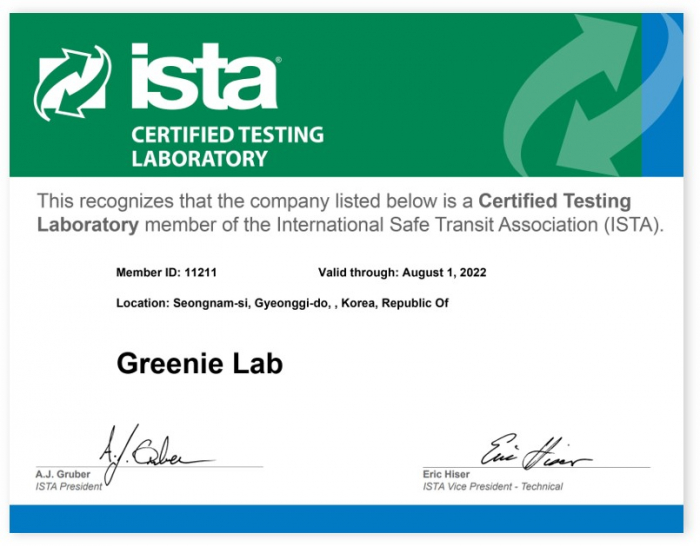
ISTA certification for S.lab Asia's Greenie Lab located in Gyeonggi Province, South Korea
The US Food and Drug Administration (US FDA) and The Center for Drug Evaluation and Research back the qualification. And S.lab Asia is the only South Korean company so far to receive it.
It did not take long for Greenie Medi to see its heyday – with the worsening of the COVID-19 pandemic in South Korea.
Different COVID-19 vaccines required varying temperatures to be maintained within containers during transport and storage. Greenie Medi was the only container manufactured in South Korea that could meet the varied requirements.
The Greenie Medi container was also about 30% more affordable than its US or German counterparts. -
[Revenue model] Greenie Box sales, rental, and new platform
S.lab Asia generates revenue now through the sale and rental of Greenie Box and Greenie Medi containers.
The startup rents or sells the boxes to food manufacturers, biotech firms, and distributors of pharmaceutical products.
It is up to the customers to decide whether they would like to purchase or rent Greenie Box or Greenie Medi containers.
On average, pharmaceutical companies prefer to buy while food retailers choose to rent. For rentals, clients pay a monthly fee over the course of three years.
The purchase price of Greenie Medi containers varies from 200,000 won ($154) to 700,000 won. The price difference is not only based on the box’s volume but also the temperature it can maintain, and the adiabatic duration.
In thermodynamics, adiabatic refers to a process or condition in which heat does not enter or leave the system.
“In terms of volume, the demand is higher in the food retail industry but pharmaceuticals yield higher margins,” said Lee. The chief executive added both markets are growing rapidly.
S.labs Asia plans to explore beyond container manufacturing and distribution to establish a cold-chain logistics platform to expand its revenue model.
The first such project will be setting up a logistics platform for pharmaceuticals and medical devices. The company plans to officially launch the service this year.
Lee explains specialized logistics markets have higher margins than those of general logistics.
To make this happen, S.labs Asia received ISO 13485 certification from the British Standards Institution (BSI), needed to store and transport medical devices.
S.labs is the first South Korean startup to attain the seal of approval.
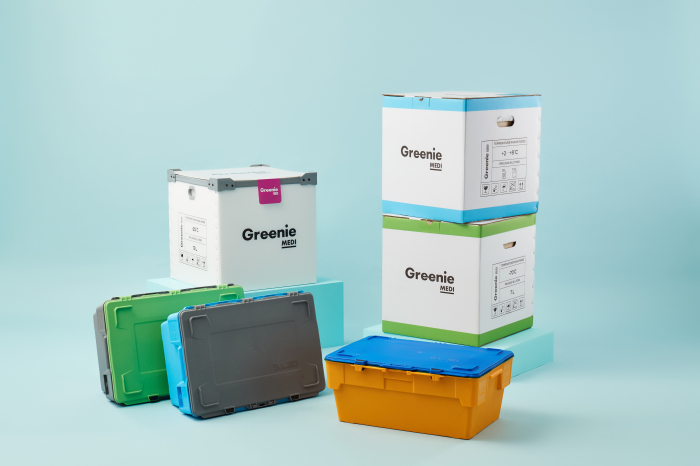
Greenie MEDI boxes come in different dimensions and price points
Lee expects the country’s logistics market for pharmaceuticals to see rapid growth from this year.
“There were no regulations on transporting pharmaceuticals in South Korea until the law was amended on Jan. 17,” the founder explained.
South Korean citizens have become aware of the importance of cold-chain logistics due to the COVID-19 outbreak, Lee added.
From July 17, pharmaceuticals and medical devices that require temperature control must be transported using certified packaging. Not only that, the temperature changes must be recorded and stored during transport.
S.labs Asia attaches thermometers to the Greenie Medi containers and shares the temperature changes on the cloud for the sender and receiver to monitor.
If either of the parties sees that the temperature has veered off course, they can cancel the transportation service.
Lee elaborated that while any company can attach thermometers to their boxes, getting certified by an international standards organization such as BSI is quite challenging. The founder stressed her company boasts a total of 45,000 hours in R&D alone. -
[Scalability] Global market
The company plans to target the global market after firming up its foothold in South Korea – with the aim of leading the market in Asia.
In the pharmaceutical arena, it wants to create a cold-chain logistics network that connects Korea’s Songdo International Business District, Hong Kong and Singapore.
The main target market is India, the world’s biggest vaccine manufacturer with a robust biotech industry.
The worldwide cold-chain pharmaceutical packaging market is expected to grow 10.8% annually from being valued at 21 trillion won in 2020 to a projected 50 trillion won by 2028, according to Fortune Business Insight.
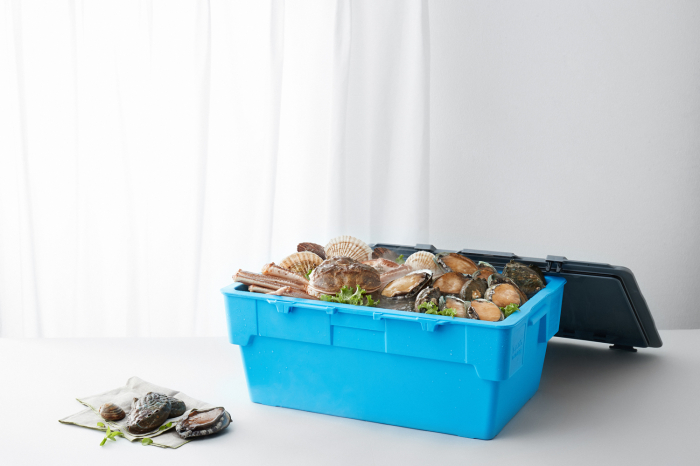
Visual representation of Greenie Medi used for transporting seafood
Lee is betting on price competitiveness and the expansive size of Japan’s seafood market to carve out a meaningful market share there.
In the fresh food sector, S.lab is eyeing Japan.
The archipelago’s cold-chain industry is already advanced, which allows for sushi made in Japan to be shipped overseas. Existing heavyweights working in the industry include Yamato Transport.
Not only that, the company will also expand its product offerings by adding bigger container sizes going forward.
Currently under development is a pallet-sized Greenie Box that is 1,200 mm by 1,200 mm, and 1,700 mm in height. To put the size into perspective, it is 30 times bigger than the current box available for sale and lease.
“The Greenie Box we have now is optimized for shipping a diverse range of products in small volumes,” Lee said. “For products like biosimilars, which have low margins, it doesn’t make much business sense to have high logistics costs.”
In other words, the pallet-sized boxes are for large-volume shipments. -
[Team building] Shifting focus from sales to R&D
Sophia Lee spent her early school days and higher-education years abroad.
The global talent studied in Canada and the United Kingdom for her middle and high school education. For college, she studied international trade at Japan’s Ritsumeikan Asia Pacific University.
The overseas exposure instilled in her a passion for introducing Korean culture to her friends – including food.
Lee explains that her export business in Southeast Asia was based on such experiences growing up.
Until 2019 when S.lab Asia began meaningful R&D on cold-chain packaging, most of the company’s human resources revolved around logistics staff.
As soon as S.lab Asia began receiving funds, the company embarked on aggressive research and development. In 2019, it built an R&D center and reorganized its company structure with the researchers being its core talent.
As it stands, S.lab’s core members are trained in materials engineering, chemical engineering and structural design.
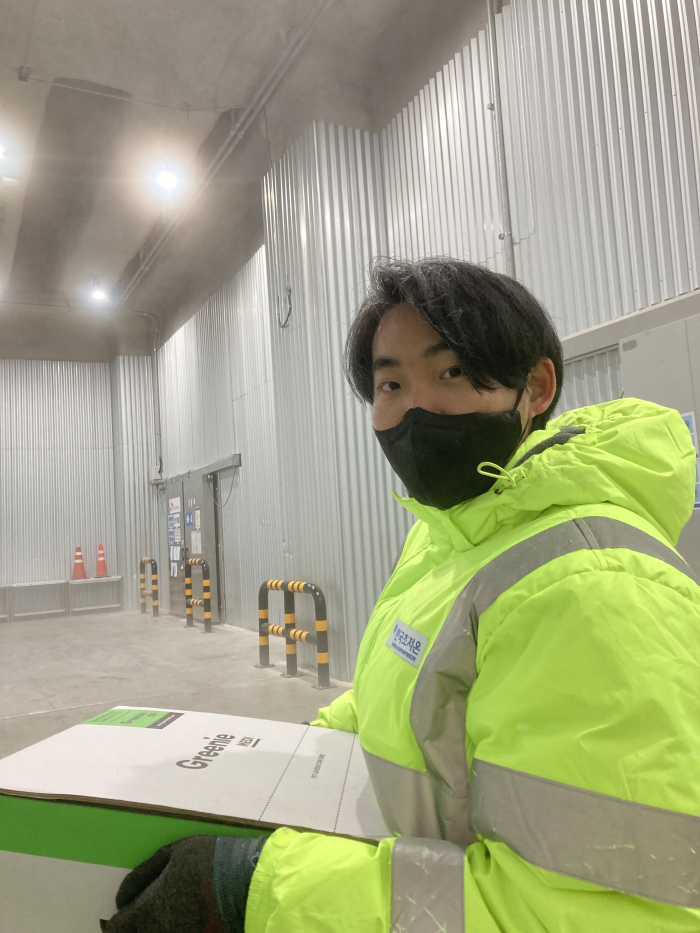
An S.lab Asia researcher inside ultra-low temperature storage
Won Man-ho, who joined S.lab last year as the second in command, is an engineer with a material engineering degree from the prestigious Korea Advanced Institute of Science and Technology (KAIST).
Lee thought Won would be a great addition to her startup based on his experience of working on a mobile platform development at internet juggernaut Naver Corp.
There are also instances in which former clients have joined S.lab. Buyers at global food retailers or conglomerates have become fascinated with the startup’s business model, according to Lee. -
[Challenge] To secure an annual production capacity of 800,000 products
The biggest challenge and task for S.lab Asia is simplifying the growing pains of ramping up its operations.
The company needs to build a mass-production system to meet the surging demand.
“The hardest part for me now is the manufacturing because we are now in a situation where we have to manufacture 1,000 units per day as opposed to the previous 10,” said Lee.
The founder added the priority is to increase its annual production capacity to 800,000 containers by the end of the year. The startup is currently in the process of seeking an expert on the production side.
Another issue to resolve, although not as urgent, is that much of the revenue is generated from the sale of containers.
Its initial plan was to provide cold chain solutions to companies that export fresh food to Southeast Asia. After COVID-19 dampened the overall export industry, the company rerouted its focus to providing the containers to domestic retailers.
“We must grow as a total cold-chain solutions provider which offers storage, dispatch, and shipment,” Lee said. “To do this, we need to build a digitized platform and more logistics centers.”
Through these steps, the startup also needs to arm itself with the best talent.
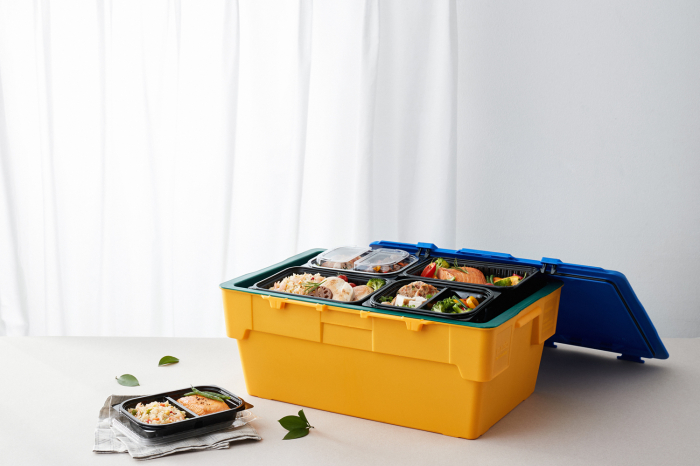
The growing meal-kit market could also help boost Greenie MEDI's use cases -
[Funding] Aiming for IPO by 2025
Last December, S.lab Asia raised 15 billion won in Series B funding.
Envisioning Partners and SKS Private Equity were lead investors. Other investors include Korea Development Bank; TBT Partners; Hyundai Motor Co.; Hana Financial Investment Co. and K & Investment Partners; as well as UTC Investment and NICE Investment Partners.
The accumulated investment amount reaches 22.8 billion won.
The Hyundai Motor Group is participating as a strategic investor, which hints at the startup’s strong growth potential.
Last February, Kia Corp. began to lay the groundwork for its Purpose Built Vehicle (PBV) business with S.lab in which its electric vehicle Niro will be used in last-mile logistics in Singapore.
Lee explained that it is challenging to equip refrigeration and freezing functions in EVs to prevent the wearing down of parts.
She is confident that the widespread adoption of EVs will only boost demand for Greenie Box products.
Series C funding is slated for this Summer.
The cash flow from Series C will be used to strengthen the company’s production capacity and build additional logistic centers – taking a step closer to building a comprehensive cold-chain infrastructure.
Lee is hopeful the corporate value will more than double between the Series B and C rounds to reach 150 billion won.
By 2025, the company is eyeing an initial public offering. Lee expects the fast-growing interest in the Environmental, Society, and Governance (ESG) sector will work favorably for the startup’s IPO.
Lee stressed that no clear leader has yet emerged in cold-chain logistics in South Korea.
“By 2025, S.labs will be the leader in the new Cold Chain as a Service (CCaaS) sector,” the founder said.
By Yoo Chang Jae; Edited by Jee Abbey Lee (yoocool@hankyung.com)